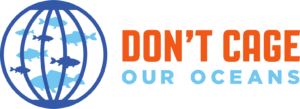Offshore fish farm lobbyists are putting their profits above the wellbeing of coastal communities and the oceans by infiltrating the Congressional Appropriations process and the Senate Committee in charge of allocating federal money for various programs. Their influence is obvious in the Senate Subcommittee language that advises how the National Oceanic and Atmospheric Administration (NOAA) should spend its money. In requesting $24 million for NOAA’s Office of Aquaculture, the Senate Committee’s report language features a dangerous recommendation to spend money on polluting forms of industrial fish farming, instead of community-driven, responsible forms of aquaculture. (As an aside, these same lobbyists are also pushing for legislation that would fast-track industrial finfish farming and cost taxpayers $350 million.)
It reads in part, “Marine Aquaculture – The Committee recognizes the significant potential for development of American offshore aquaculture to increase U.S. production of healthful, sustainable, and affordable seafood…” Whoops. Let’s pause right there for a second.
Concentrated animal feedlot operations (CAFOs) in the ocean do not create “healthful” seafood; these farmed fish are fed an unnatural diet of ground up wild fish, various land-based monoculture crops like genetically modified canola and soy, and toxic chemicals laced in the feed and openly dosed into the flow-through pens.
These ocean-based fish farms are not remotely sustainable. Enthusiasts creatively omit the true Greenhouse Gas (GHG) emissions and ecosystem impacts of:
- Industrial-scale fishing of critical forage fish species from around the world that harm ecosystems and threaten fishing communities’ food security.
- Sending the forage fish for processing and then shipping the ground up fish pellets to the fish farms.
- Feeding the farmed fish with rates requiring more fish going into the system than is actually coming out of the system – or being harvested.
- The nutrient overload and the wastes openly discharging into and polluting our oceans.
Finally, these CAFOs of the sea will not grow affordable fish. Proponents who seek to grow carnivorous fish in the ocean must have access to vast sums of capital to purchase, establish, and operate fish pens, mooring lines, and feed barges. To get a return on their investment, they must grow fish that can be sold at a high price point, so they are marketed to expensive restaurants in the U.S. and abroad – a wasteful process that robs respurces from most of the world to feed a few rich people.
Which leads us to the “seafood trade deficit” that is so often erroneously paraded around by lobbyists. The report language requests $5 million to “establish a new cooperative institute” to help address that “deficit.” What lobbyists won’t tell you is that the U.S. already catches enough wild-caught fish to feed the country at current seafood consumption levels, but that the vast majority of this is exported – or worse – caught domestically and then exported for processing, only to be reimported and tallied by NOAA as an “import.” So by sending the good stuff away (and by ignoring the vast quantities of imported shrimp), proponents get to pretend that industrializing our oceans with floating fish CAFOs will somehow address that imbalance by farming fish and then exporting it to the highest bidder. This does nothing for local coastal communities or feeding people living in the U.S.
DCO2’s members and allies believe that wasting taxpayer money to prop up dirty industries is the wrong way to grow our seafood economies. Instead, community-driven aquaculture embedded in values, responsibly-sited and appropriately scaled, can indeed be a way to help local economies and the environment. Let’s uplift small fishing businesses that are the heartblood of coastal communities and run by real people who live in them, instead of letting distant venture capitalists get fatter off of our tax dollars and wreck our oceans in the process.
